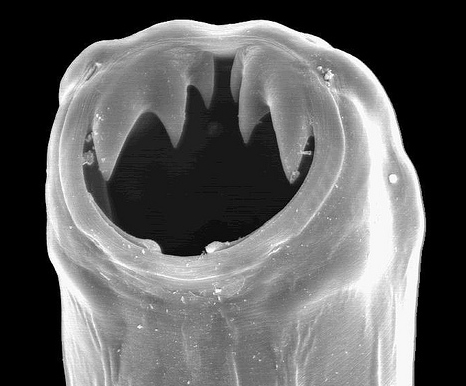 The eusociality
symbiont hypothesis relating to the evolution of eusociality
pictures a positive feedback loop of interactions between hosts
and symbionts, with each new symbiont pulling the colony tighter
together as the symbionts manipulate their hosts into coming into
contact with each other in order to reproduce.
The eusociality
symbiont hypothesis relating to the evolution of eusociality
pictures a positive feedback loop of interactions between hosts
and symbionts, with each new symbiont pulling the colony tighter
together as the symbionts manipulate their hosts into coming into
contact with each other in order to reproduce.The positive feedback loop involved in the hypothesis is counteracted by negative interactions involving hosts and symbionts - in other words by parasitism. As hosts interact more closely parasites can also spread horizontally between them. Since horizontal transmission promotes misalignment between host genes and parasite genes, after a certain point, parasites start to dominate more helpful symbionts - and then the hosts start to behave as though they want to live further apart from one another.
The significance of parasites is evident in most social insect colonies. These are vulnerable to parasitism - due to the close proximity of the members - and it is not uncommon to see nests obliterated by parasites. On the other hand, because of the parasite threat, the nests themselves are often policed by cleaning squads. Disease eradication is a big theme. Sick individuals are exiled and everything is kept remarkably clean.
Humans are a case study for the eusociality symbiont hypothesis. Our symbionts are typically cultural, but the basic dynamics are much the same - the cultural symbionts manipulate the humans into coming into contact with each other in order to reproduce. The result is human ultrasociality.
We know that humans living in close proximity are more vulnerable to horizontal transmission of genes. We can see this by comparing sick city dwellers with their more healthy country cousins. Parasite transmission favors situations where humans are crowded together. We have institutions to deal with this - such as hospitals.
Close proximity also favors horizontal memetic transfer. Assuming that humans want to avoid exploitation by deleterious memetic parasites, we are going to need organizations and institutions that promote epistemic hygine. These will involve schools, as well as other types of training more focused on the memetic immune system.
The negative effects of memetic parasites are clearly evident today. We have an obesity epidemic driven by fast food advertising. There are smoking, drinking and caffination epidemics which are widespread. Over the counter drugs are widely abused. Paranoia epidemics are fostered by the news media with resulting scares about terrorism, global warming, vaccination, resource depletion, and so forth.
Epistemic hygiene can reasonably be expected to become a big focus. Not necessarily the 'thought police' pictured by George Orwell - but other government-level infrastructure to protect populations against the negative effects of bad memes.

 Williams and Nesse famously called for
Williams and Nesse famously called for 
 What to do if you have an over-active immune system - and are suffering from auto-immune self-strikes, in the form of allergies, lupus, multiple sclerosis, Crohn’s disease, etc.
What to do if you have an over-active immune system - and are suffering from auto-immune self-strikes, in the form of allergies, lupus, multiple sclerosis, Crohn’s disease, etc.








